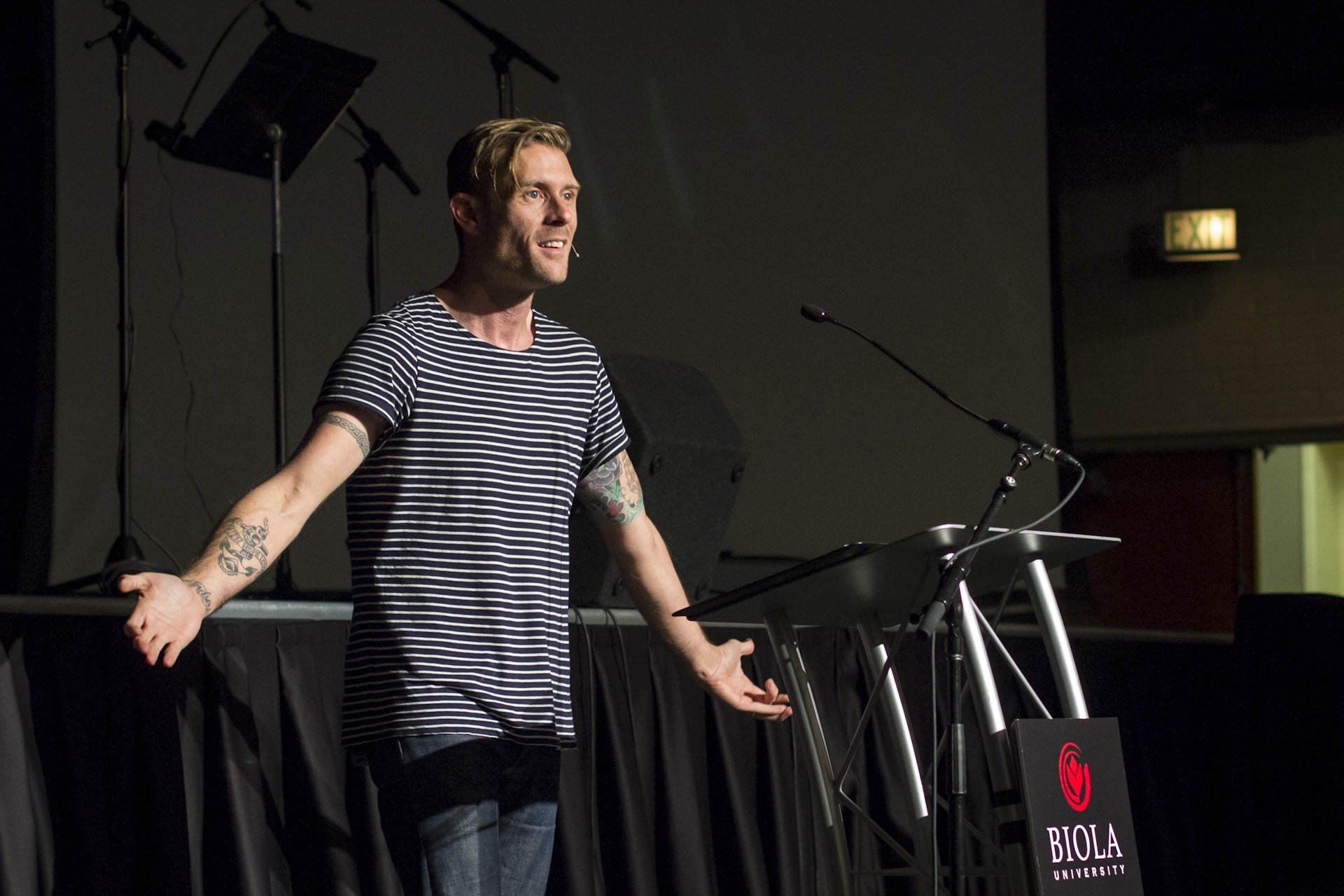Tim Chaddick, pastor of Los Angeles evangelical church Reality LA, came to speak Tuesday for the third and final Associated Students religious lecture of the fall semester, “Broken Stories: Jesus Redeems Our Souls."
After hearing Chaddick speak at a conference, Matt Fier, senior psychology major and AS religious lectures coordinator, was convinced that Biola students needed to hear his message of redemption for the Christian’s broken story.
Chaddick, who came from a lifestyle of sexual promiscuity and addiction to alcohol and drugs, became a Christian in 1999 and eventually led a church plant from Reality Carpinteria to LA in 2006.
Biola students and faculty have elevated discussions of sexuality this semester with Fier’s religious lecture series, including the homosexuality panel and the former sex worker lecture, and the Call to Manhood events that are organized by associate dean of students Matthew Hooper.
Fier highlighted the progression of the semester’s religious lectures, which he said purposefully looked at the reasons for why sexuality matters, how our perceptions of people change when we hear their stories, and why our own stories matter.
He was worried that students tend to ignore their own brokenness.
“A lot of times as Christians we look at our stories and then we say, ‘Jesus redeemed it and now I’m good,’ and that’s how we evangelize,” he said.
Connections between sexuality and identity are generational
Chaddick emphasized identity. Natalie Capistran, a senior cinema and media arts major who attends Reality LA, thinks Chaddick’s message is one that this generation needs to hear.
“I like that when he talks about sexual identity he also talks about success, or our want to identify ourselves with finances or friendships,” she said. “I think that’s a really important way to paint sexuality.”
Chaddick also challenged the current perception of sexuality in his talk.
“Sexuality is now considered to be an essential, if not fundamental, aspect of our very identity,” he said. “It’s connected to finding love, fulfillment and happiness in life.”
Joe Schreiner, a sophomore biological science major, resonated with Chaddick’s talk.
“It talked more about how sexuality doesn’t define a person, and I feel like that’s a common misconception. Most people think that their sexual identity defines you, but it doesn’t have to,” he said.
Chaddick explained that ever since the sexual revolution that began in the 1960s, people have made their sexuality a defining factor of their identity. He also noted that sexuality is only part of the problem of sexual sin and that there are many underlying issues leading to it as well.
Schreiner thought that this was an important point of Chaddick’s talk.
“Sexuality is the sin but then there’s something under that that’s really the root; I feel like that’s the problem with most people, whether it’s anger with God or your past or whatever,” Schreiner said.
Continuing discussions on sexual brokenness
The Call to Manhood events have also been discussing these issues. The latest event, held on Wednesday, Nov. 28, focused on masculinity and sexual addiction. Riley Corbett, a sophomore business marketing management major, attended the event and believes there is a need for more events, speakers and discussions like these.
“Not only does [pornography] need to be addressed, but there needs to be a way for guys to get help,” Corbett said.
The speakers at the Call to Manhood event spoke particularly about pornography addiction, though Corbett acknowledged that it is part of the larger picture.
Fier said that in the past, Christians as a whole have neglected conversations about sexuality.
“[We have] a fear of being exposed, or a fear that leads to hatred,” Fier said. “So we don’t talk about porn addictions and the sex industry because we’re afraid of bringing up our past. We don’t talk about homosexuality because we’re flat out, as Christians, afraid of that culture and demographic.”
Schreiner agrees that more discussion is needed, especially because Biola students are so close to LA where he says sexual brokenness is a big issue.
“I think it’s really relevant to a lot of what’s going on now, not just here but I think anywhere, Christian or not, I think sexuality is a big topic,” he said.
Corbett says that discussing the issues will help in the healing process.
“Sin has a way of binding us in shame, which is a lie of Satan,” he said. “If we don’t seek healing and repentance it will eat away at us, leaving us unsatisfied — [leaving] a void only Christ can fill.”
Capistran emphasized that our identity in God first is what is most important. She says that believers should have identity in the fact that they are children of the Lord before they find their identity in gender.
“Your identity is in Christ and Christ alone,” Capistran said. “Your identity is not in how much money you make, it’s not in your sexual preference and it’s not in the people who you surround yourself by.”








